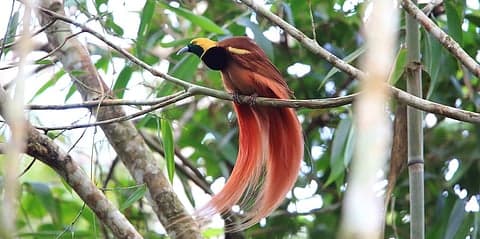PNG's rainforest in danger; illegal logging crisis fuel human rights abuses and threaten biodiversity

Raggian Bird-of-Paradise in Varirata Park, PNG
Shimali Chauhan | Down to Earth
Papua New Guinea has the third-largest rainforest in the world, but it is facing a serious crisis. Illegal logging activities are harming the environment, causing human rights violations, and leading to widespread corruption.
At the just-concluded 16th Conference of Parties (COP16) to the Convention on Biological Diversity, local environmental groups from Papua New Guinea raised these urgent issues and called for international action to stop illegal logging that is damaging one of the most biodiverse areas on the planet.
Illegal logging is now a major global problem. It is worth about $155 billion a year and is considered the third-largest organized crime worldwide. This problem is fueled by high profits, weak laws, and low prosecution rates.
Aina Grødahl, a senior advisor from the Rainforest Foundation Norway, noted that forests in Papua New Guinea are being overexploited to meet the demand for timber, especially from countries like China and Malaysia.
Many of these illegal activities are disguised as legitimate logging, putting at risk the unique ecosystems that host about 7 per cent of the world’s biodiversity.
Papua New Guinea’s rainforests are rich in biodiversity, housing rare species such as birds of paradise, tree kangaroos, and the Queen Alexandra’s birdwing butterfly. These forests represent only one per cent of Earth’s land but play a vital role in absorbing carbon and supporting the lives and traditions of Papua New Guinea’s indigenous peoples.
Due to international demand for timber, Papua New Guinea has become one of the leading exporters of tropical logs, with a significant amount coming from illegal sources.
According to a recent assessment by the Bank of Papua New Guinea, the logging industry is considered high risk for money laundering and illegal profits.
Local groups have reported that logging companies often evade taxes and engage in corrupt practices, aided by the Papua New Guinea Forest Authority, which issues timber permits without thorough checks.
The illegal logging crisis also deeply affects local communities. Pamela Avusi, from the Papua New Guinea Environmental Alliance, stated that logging companies often ignore the rights of indigenous people, failing to obtain necessary permissions for their activities.
This lack of respect leads to the displacement of communities, environmental destruction, and loss of essential resources for food and cultural practices.
Avusi pointed out that the demand for Papua New Guinea timber contributes not only to environmental harm but also to human rights abuses. People living near logging sites have reported instances of police violence and intimidation, allegedly in partnership with the logging companies.
Evelyn Katu Wohuinangu, a lawyer from the Centre for Environmental Law and Community Rights (CELCOR), described how indigenous people can be imprisoned in shipping containers as a threat.
Katu Wohuinangu has been helping these communities legally and stressed the need for transparency and accountability in the timber trade. She called for better tracking of timber products and stricter rules from international banks that finance logging operations to prevent further harm.
Fabian Paliken from the Consultative Implementation and Monitoring Council stressed the need for a united approach involving the government, businesses, and civil society.
He urged the creation of a system to trace timber sources effectively, which would help combat illegal logging.
Aina urged the international community that “markets that depend on Papua New Guinea timber must understand their role in supporting deforestation and human rights violations.” She called for halting all timber exports from Papua New Guinea until a thorough investigation of logging permits is completed.
Civil society groups like CELCOR and the Papua New Guinea Environmental Alliance are calling for immediate action from the Papua New Guinea government and the international community to protect the remaining forests and the rights of indigenous peoples.
Futher evidence of illegal logging from Act Now's recent case studies reports on abuse of Forest Clearence Authority (FCA) licences here.
